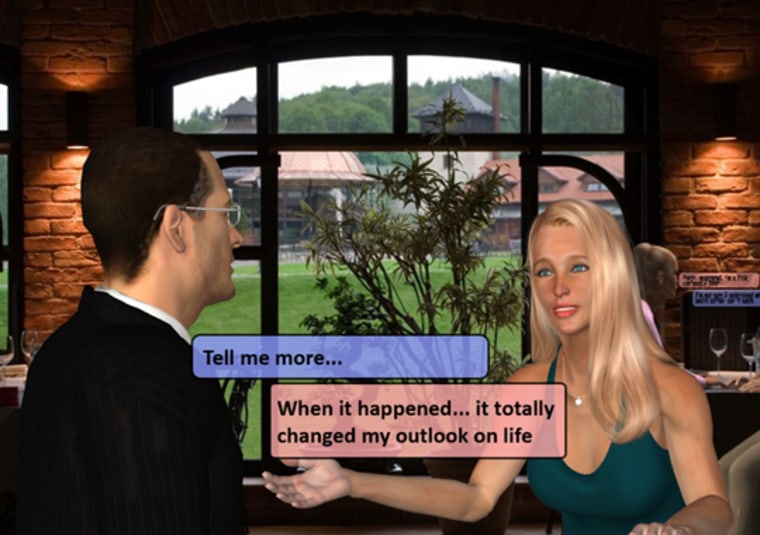I went on a date with another woman. She had long blonde hair, wore a tank top, and liked to wink at me. We met at a bar and listened to soft music as we played small games and got to know each other. I held her hand and after five minutes she asked if she could kiss me, and I accepted.
Maybe my girlfriend will be able to forgive me since this was a virtual date and I was researching a story (honest!). The woman (or rather, her avatar) I met was Ravit Abelman, co-founder of virtual dating site OmniDate, and she was letting me try out all the various functions. Visitors to major online dating Web sites could soon see virtual dating functions.
"With email the anticipation builds and builds and by the time you actually meet the person there is a mountain of expectation," said Abelman. "All people want is to learn more about the person behind the online profile in a safe and comfortable manner."
Going on a virtual date entails logging onto a Web site like OmniDate and creating an online profile, like many other Web sites. Unlike other Web sites, a virtual date also requires setting up an avatar, or virtual representation of yourself, from a library of avatars.
Currently the avatars on Omnidate's Web site are only approximations of your real appearance, although that will soon change. Omnidate is developing software that will automatically convert an uploaded photo of yourself into an online avatar for a more realistic image of you and your date.
When a single you are interested in logs in, you can ask that person for a virtual date. Once the person agrees, your two avatars are transported to a random setting, such as a bar (as in my date), a cafe or on a beach. Couples can then play games to break the ice, choose what music to listen to, and write messages that pop up as text boxes.
If a person likes what he or she is hearing, they can press a button and briefly hold the other avatar's hand, touch their face, or blow a kiss. After five minutes a "kiss" function appears. Press it, and if the other person permits it, one avatar holds the other to plant a gentle smooch.
If the couple gets along well enough, they can then decide to meet each other in person. According to Abelman, being able to ask a potential partner questions on the fly while in a safe and comfortable setting helps to empower women in particular.
"A lot of women want to know what they are getting into before jumping into the water," said Abelman. "If women can meet a potential date from the comfort and safety of their own couch, then when they do meet in person they are no longer strangers."
The virtual dating experience, even one as business-minded as my own, is surprisingly intimate, which helps explain the relative success of virtual dating compared with the major dating sites.
Last year a study by researchers at Harvard and Duke showed that couples who go on virtual dates before a face-to-face date are two times more likely to say that they would go on a second date with a person.
"Virtual dating doesn't create these unrealistic expectations based on ambiguous profile postings," said Dan Airely of Duke University, a co-author of the study "It's like getting to take a bite of an apple, instead of having someone tell you what an apple is supposed to taste like."
